 Ancient people divided time into twelve two-hour periods, and our twelve meridians are symmetrically distributed on both sides of the body. The twelve periods correspond to the twelve meridians, with different periods corresponding to different meridians, which we can use for health maintenance.The following animated diagrams of these meridians can provide reference for everyone.
Ancient people divided time into twelve two-hour periods, and our twelve meridians are symmetrically distributed on both sides of the body. The twelve periods correspond to the twelve meridians, with different periods corresponding to different meridians, which we can use for health maintenance.The following animated diagrams of these meridians can provide reference for everyone. 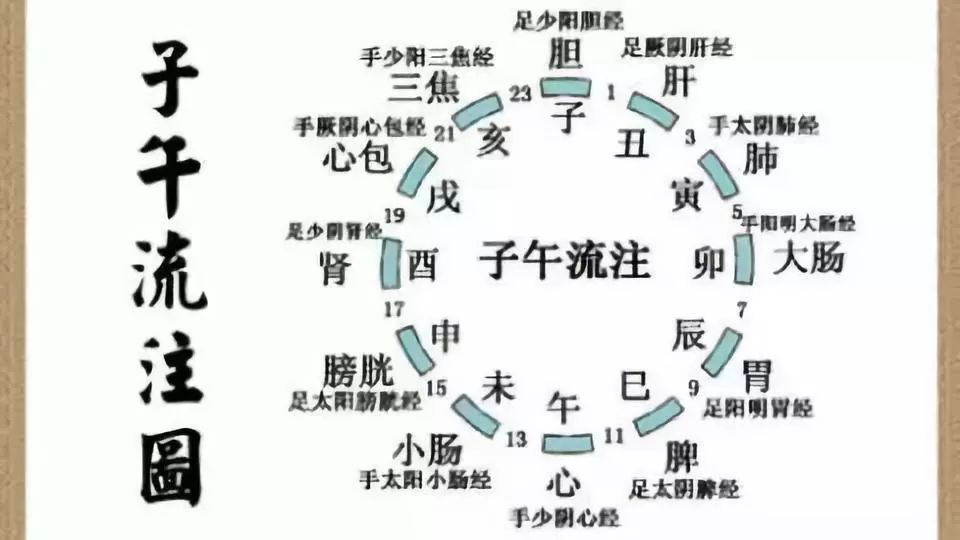 Hand Taiyin Lung Meridian
Hand Taiyin Lung Meridian
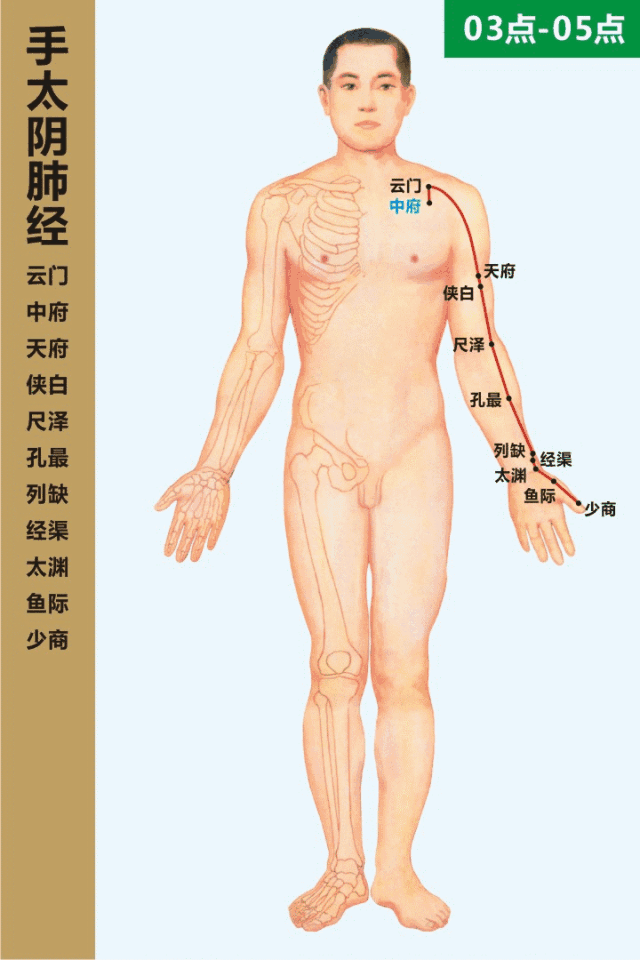
The Lung Meridian runs from the chest to the thumb, with the inner side of the arm belonging to the Yin meridian; it controls respiration and immunity. Sensitivity to dryness can lead to nasal congestion; body heat and sweating can cause back acne, and dryness with phlegm can lead to throat pain; colds can cause chills and emptiness in the body.
Yin Hour (3 AM to 5 AM) — Lung Meridian is Strong
Sleeping soundly during the Yin Hour, complexion red and energy abundant
“The lungs connect to all the meridians.”
After the blood is renewed by the liver during the Chou Hour, fresh blood is supplied to the lungs, which then distributes it throughout the body. Therefore, people have a rosy complexion and abundant energy in the morning. During the Yin Hour, those with lung diseases respond most strongly, such as severe coughing or asthma that wakes them up.
Excess Conditions: Abdominal distension, constipation, prone to hemorrhoids, discomfort or pain in the shoulder and back, toothache, skin abnormalities, and upper abdominal issues.
Hand Yangming Large Intestine Meridian
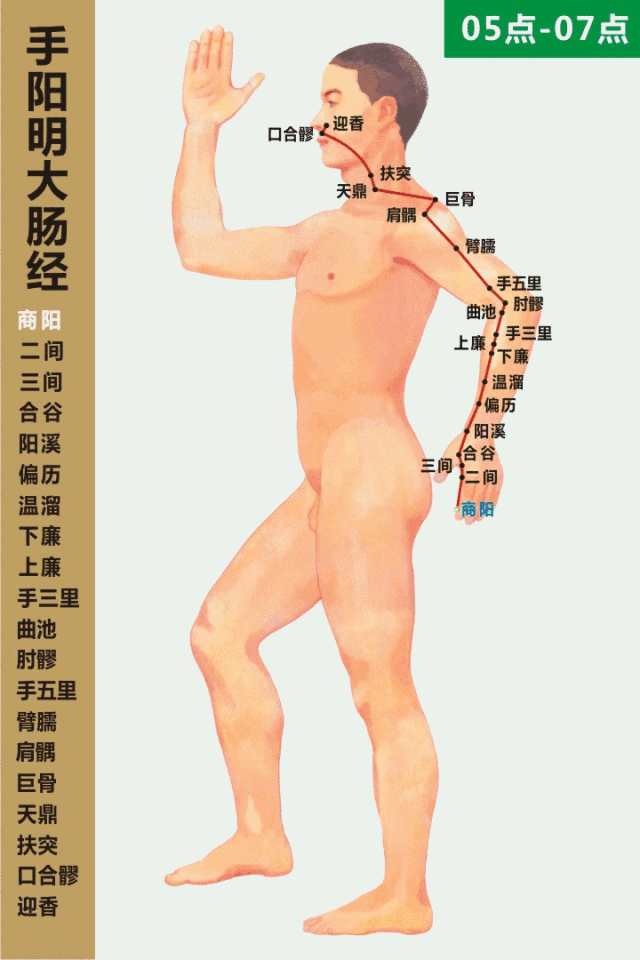
The Large Intestine Meridian runs from the index finger to the armpit, with the outer side of the arm belonging to the Yang meridian; it controls digestion and the nervous system. If it is blocked, it can cause abdominal pain; constipation, dry mouth, shoulder and neck pain, body heat, hemorrhoids, and headaches.
Yin Hour (5 AM to 7 AM) — Large Intestine Meridian is Strong
During the Yin Hour, the large intestine peristalsis occurs, expelling toxins.
“The lungs and large intestine are interrelated.”
The lungs distribute sufficient fresh blood throughout the body, which then stimulates the large intestine to absorb water and nutrients from food and expel waste. It is best to have a bowel movement after getting up in the morning.
Excess Conditions: Easily hungry, weak stomach, joint abnormalities, appetite changes, dry mouth, prone to constipation.
Health Maintenance:
After getting up, drink a cup of warm water, rest for 10-20 minutes to clear your mind before going to the toilet to relieve constipation. Do not rush to the toilet; many elderly people suffer strokes because of this.
It is recommended to choose foods such as eggplant, spinach, bananas, mushrooms, black fungus, corn, lentils, and peas.
Foot Yangming Stomach Meridian
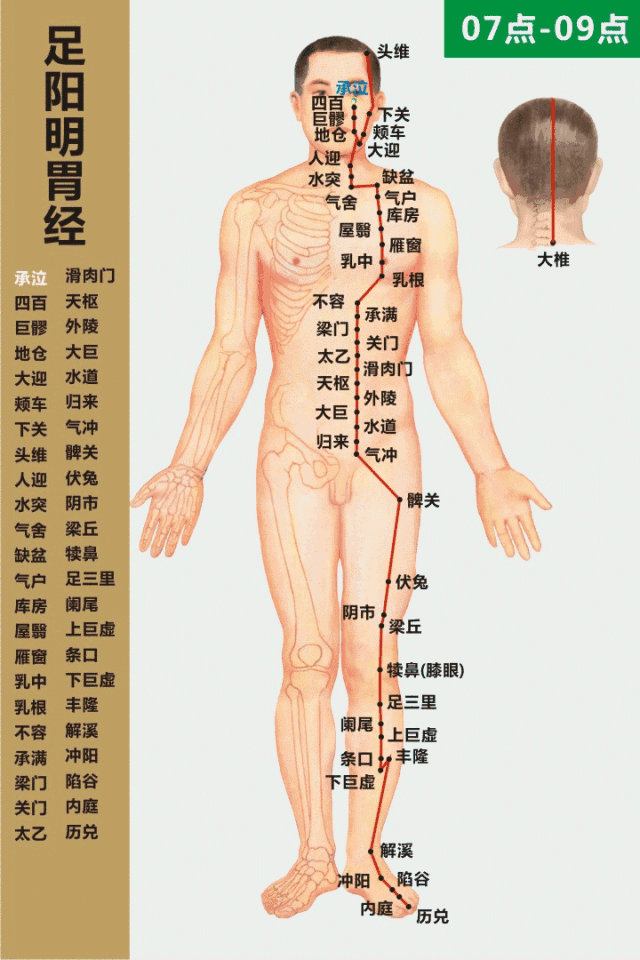
The Stomach Meridian is located in front of the Gallbladder Meridian, three finger widths from the center; oral ulcers, swollen gums, dry mouth, bad breath, abdominal pain; body heat leads to belching and a preference for cold foods, with dry and obstructed stools.
Chen Hour (7 AM to 9 AM) — Stomach Meridian is Strong
During the Chen Hour, having breakfast nourishes the body.
During this time, eating breakfast is easiest to digest and absorb. Breakfast can include gentle stomach-nourishing foods such as porridge, oatmeal, and buns. Overly dry and hot foods can lead to excessive stomach fire, causing issues like chapped lips and sores. Skipping breakfast can lead to various diseases.
Excess Conditions: Spleen and stomach disharmony, poor digestion and absorption, prone to abdominal bloating, belching, headaches, fatigue, joint abnormalities, and abnormal bowel movements.
Health Maintenance:
This is the time to have breakfast. If you do not provide food, the stomach will continue to secrete gastric acid.
If you go too long without eating, you risk developing gastric ulcers, gastritis, duodenitis, and cholecystitis!
After meals, massaging the Stomach Meridian can help regulate gastrointestinal function.
Foot Taiyin Spleen Meridian
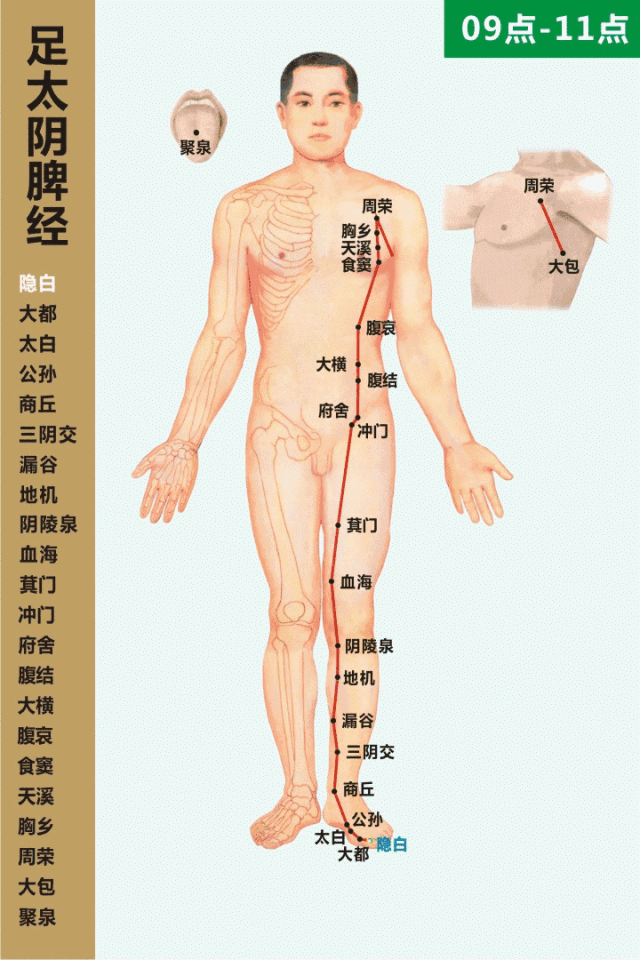
The Spleen Meridian corresponds to the Stomach Meridian, controlling the immune and nervous systems; bloating, belching, and gas, unbearable vomiting, pain under the ribs; varicose veins, low blood pressure, rheumatism, and joint pain.
Si Hour (9 AM to 11 AM) — Spleen Meridian is Strong
During the Si Hour, the Spleen Meridian is strong, producing blood for the body.
“The spleen governs transportation and transformation, and it controls blood.”
The spleen is the main regulator of digestion, absorption, and excretion, and it also governs the blood in the body.
“The spleen opens to the mouth, and its beauty is reflected in the lips.”
When the spleen functions well, digestion and absorption are good, and blood quality is high, resulting in rosy lips. Pale lips indicate insufficient blood and energy, while dark or purple lips indicate cold entering the Spleen Meridian.
Health Maintenance:
Disharmony between the spleen and stomach leads to poor digestion and absorption, and spleen deficiency can cause memory decline.
This period is the best time for the Spleen Meridian to open its acupoints and function. If possible, it is recommended to cook at home and choose foods like lentils, sweet potatoes, potatoes, tofu, celery, corn, and rice.
Fruits can include apples, oranges, lemons, and tangerines. Teas can include green tea, flower tea, and honey water.
Hand Shaoyin Heart Meridian
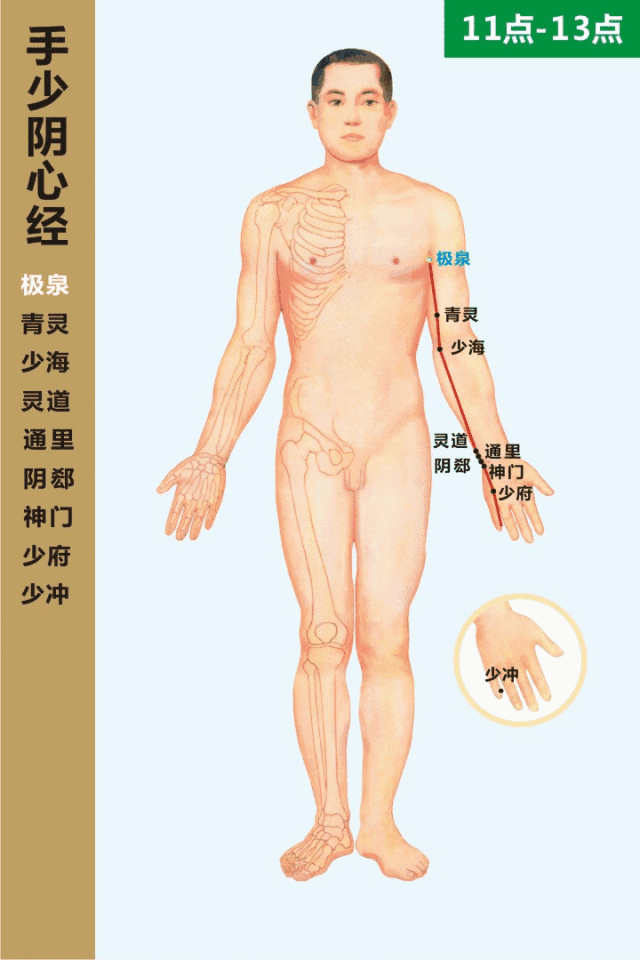
The Heart Meridian runs to the little finger, with the inner side of the arm belonging to the Yin meridian; it controls the circulatory system, with chest heaviness and headaches; irritability, insomnia, and vivid dreams; pain in the shoulders and chest; red eyes, dry mouth, poor blood circulation, preferring quiet; excessive worries and stress.
Wu Hour (11 AM to 1 PM) — Heart Meridian is Strong
During the Wu Hour, a short rest calms the mind and nourishes energy.
“The heart governs the spirit, opens to the tongue, and its beauty is reflected in the face.”
The heart energy promotes blood circulation, nourishing the spirit, energy, and tendons.
During the Wu Hour, a short nap is very beneficial for heart health, allowing for abundant energy from afternoon to evening.
Hand Taiyang Small Intestine Meridian
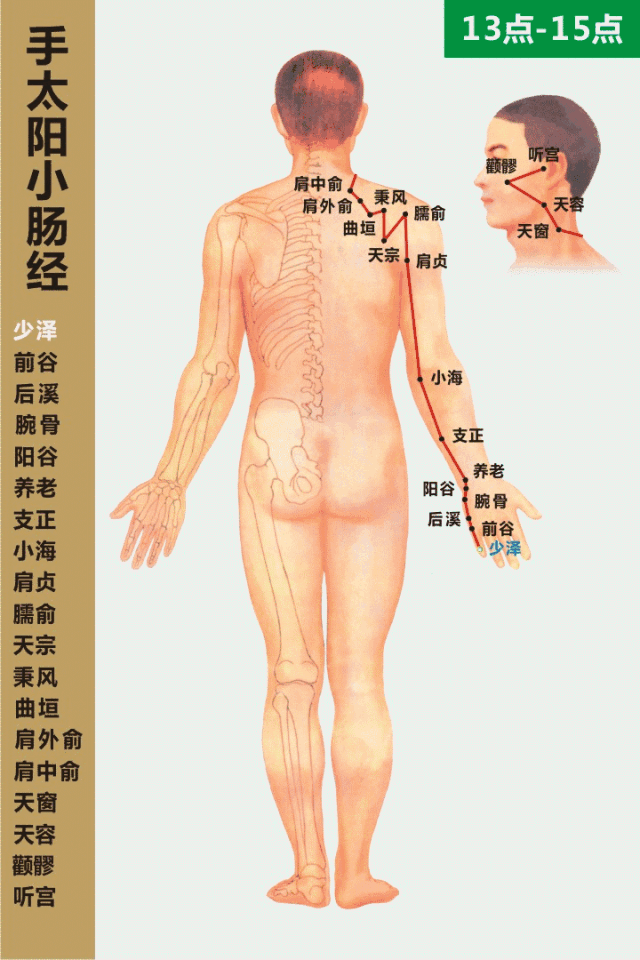
The Small Intestine Meridian runs from the little finger to the shoulder, with the outer side of the arm belonging to the Yang meridian; it controls digestion and the nervous system, with pain in the ears during the sun; abdominal bloating before menstruation, headaches in the back of the head, and pain from the shoulder blade to the back.
Wei Hour (1 PM to 3 PM) — Small Intestine Meridian is Strong
During the Wei Hour, the small intestine separates clear from turbid, and drinking water can reduce heat.
The small intestine separates clear from turbid, directing fluids to the bladder and waste to the large intestine, while the essence is sent to the spleen. The Small Intestine Meridian adjusts the body’s nutrition during the Wei Hour.
If there is heat in the small intestine, one may experience dry cough and flatulence. Drinking more water and tea during this time is beneficial for the small intestine to expel heat.
Foot Taiyang Bladder Meridian
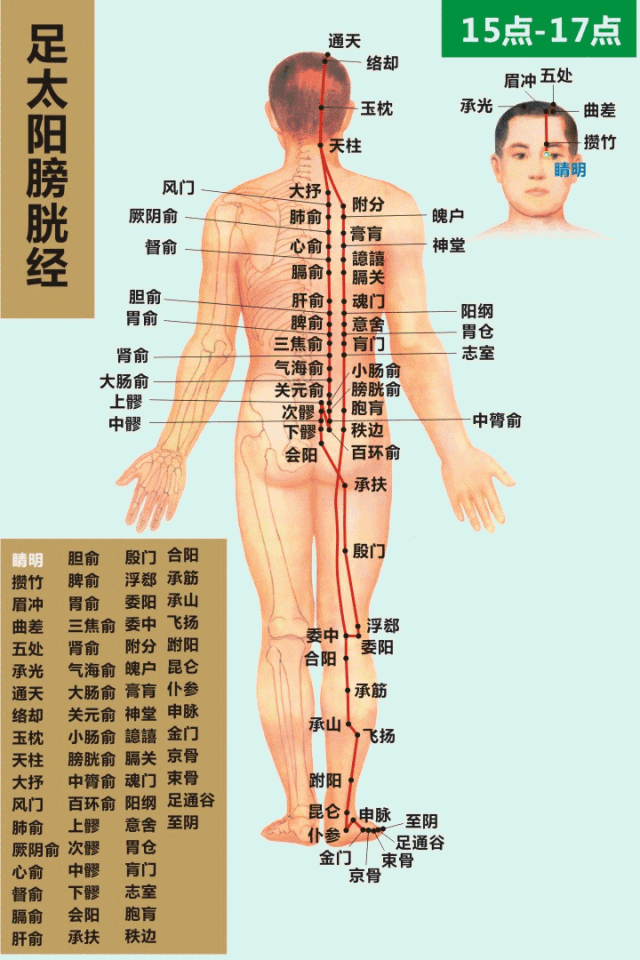
The Kidney Meridian corresponds to the Bladder Meridian, controlling the urinary and skeletal systems; yellow urine, bladder pain, urinary tract inflammation; weakness in the limbs, back pain, difficulty sitting due to hemorrhoids, and shoulder and neck pain.
Shen Hour (3 PM to 5 PM) — Bladder Meridian is Strong
During the Shen Hour, body fluids are sufficient, nourishing Yin and relaxing the body.
The bladder stores water and body fluids, expelling them from the body while circulating fluids internally.
If there is heat in the bladder, it can lead to bladder cough and urinary incontinence.
During the Shen Hour, the body temperature is higher, and those with Yin deficiency are most prominent.
Appropriate activity during this time helps circulate body fluids, and drinking Yin-nourishing and heat-clearing teas is most effective for those with Yin deficiency.
Foot Shaoyin Kidney Meridian
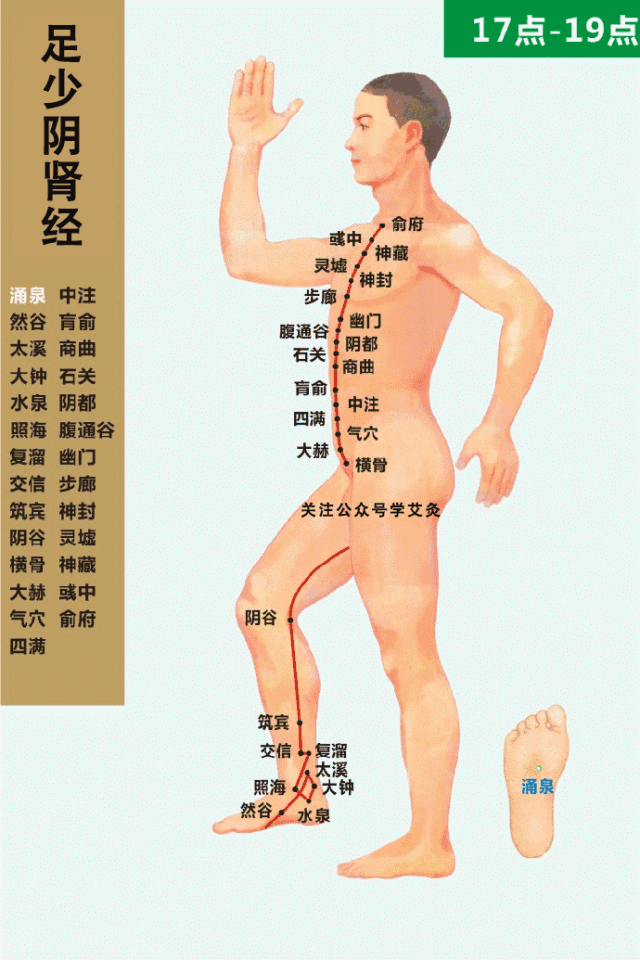
The Kidney Meridian is located behind the Liver Meridian, not far apart; it controls the endocrine system, with scanty urine and frequent urination; bags under the eyes, wrinkles, cold feet, swollen lower limbs, anxiety; back pain before menstruation, facial spots, and heart palpitations; memory decline and insomnia, symptoms gradually improving.
You Hour (5 PM to 7 PM) — Kidney Meridian is Strong
During the You Hour, the kidneys store essence and absorb pure energy.
“The kidneys store reproductive essence and the essence of the five organs.”
After the Shen Hour of detoxification, the kidneys enter the phase of storing essence during the You Hour.
At this time, excessive exercise and drinking large amounts of water are not advisable.
Hand Jueyin Pericardium Meridian
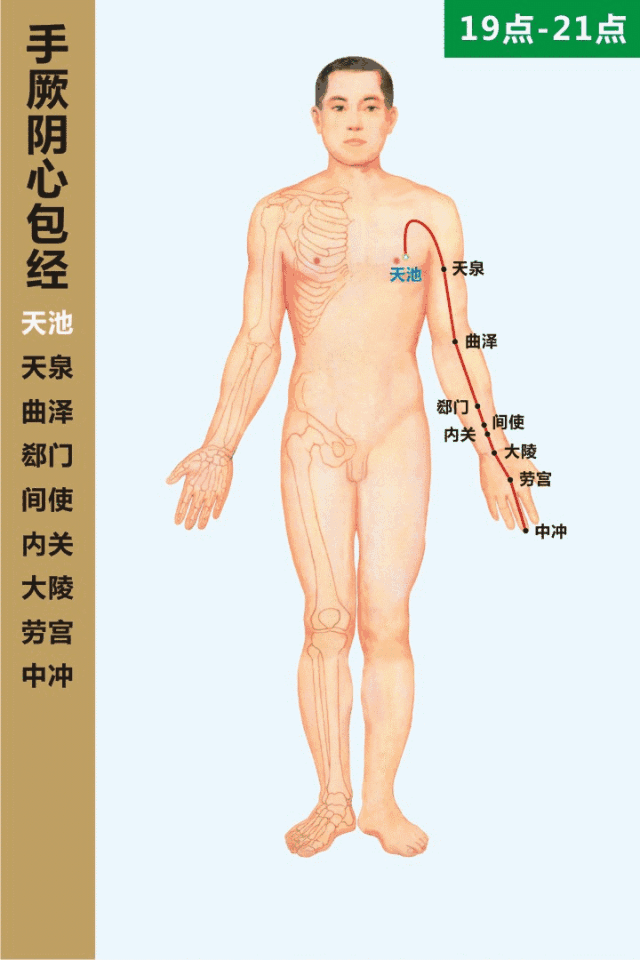
The Pericardium Meridian runs from the chest to the middle finger, with the inner side of the arm belonging to the Yin meridian; it controls secretion and circulation, with poor circulation and vascular diseases; rapid heartbeat and constipation, irritability, red eyes, and pain in the upper limbs.
Xu Hour (7 PM to 9 PM) — Pericardium Meridian is Strong.During the Xu Hour, protect the heart, relieve pressure, and promote heart comfort;
“The pericardium is the outer membrane of the heart, containing vessels, and is the pathway for Qi and blood. Evil cannot reside here, as it harms the heart.”
The pericardium is the protective tissue of the heart and also a pathway for Qi and blood.
The Pericardium Meridian is most active during the Xu Hour, clearing external evils around the heart, keeping the heart in a healthy state.
At this time, it is essential to maintain a pleasant mood: read, listen to music, do spa, dance, or practice Tai Chi to relax and relieve stress.
Hand Shaoyang Sanjiao Meridian
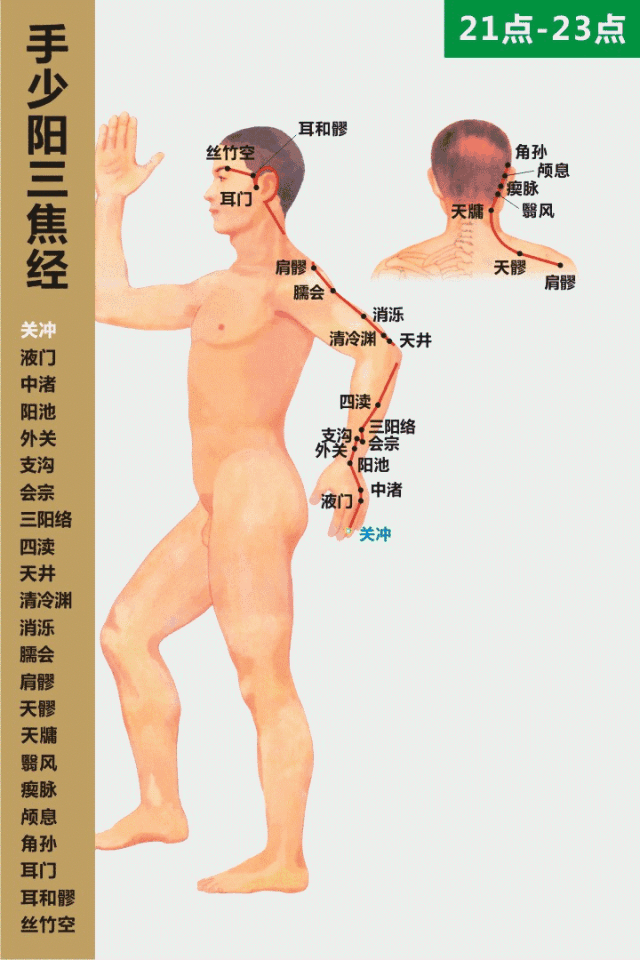
From the unnamed point to the shoulder, the Sanjiao Meridian runs on the outer side of the arm, belonging to the Yang meridian; it controls secretion and circulation, with decreased immunity and depression; fatigue and susceptibility to chronic diseases.
Hai Hour (9 PM to 11 PM) — Sanjiao Meridian is Strong.During the Hai Hour, all meridians are connected, nourishing the body and enhancing beauty.
The Sanjiao is the largest of the six fu organs, responsible for hosting Qi and regulating water pathways. During the Hai Hour, the Sanjiao can connect all meridians.
If a person sleeps during the Hai Hour, all meridians can receive the best rest and recovery, which is very beneficial for health and beauty.
Centenarians share a common trait of sleeping during the Hai Hour. If you do not wish to sleep at this time, you can listen to music, read, watch TV, or practice yoga, but it is best not to stay awake past the Hai Hour.
Foot Shaoyang Gallbladder Meridian
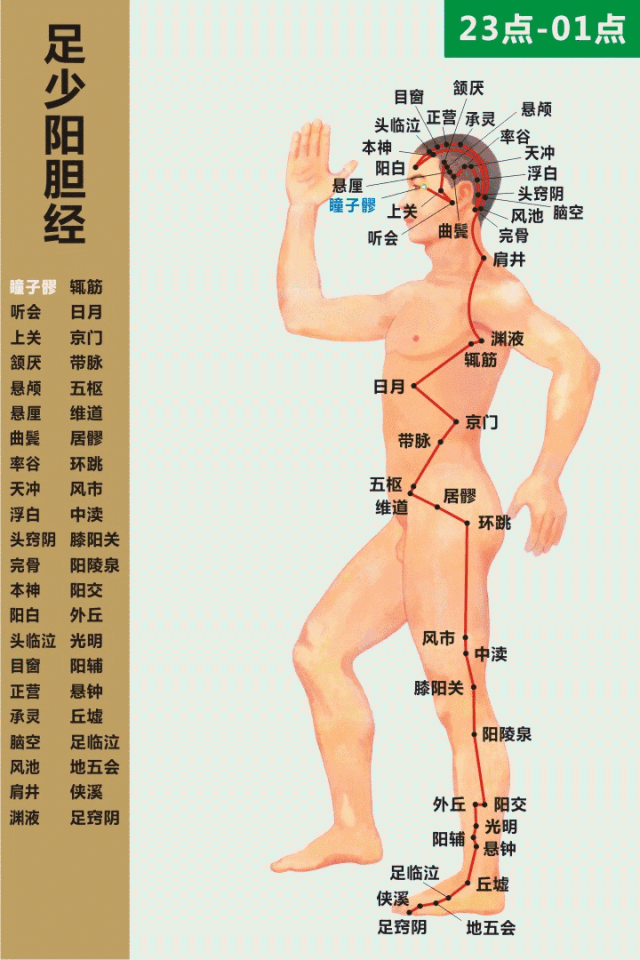
The Gallbladder Meridian runs along the pants seam, with secretion disorders affecting the nervous system; drowsiness, sweating, fatigue; swelling in the armpits and headaches; local inflammation and swelling, and blurred vision.
Zi Hour (11 PM to 1 AM) — Gallbladder Meridian is Strong.Sleeping during the Zi Hour prevents dark circles.
Traditional Chinese medicine theory states: “The excess Qi of the liver is released into the gallbladder, where it is concentrated and transformed into essence.”
If a person sleeps before the Zi Hour, the gallbladder can complete its metabolism.
“The clearer the bile, the clearer the mind.”
Those who sleep before the Zi Hour wake up with a clear mind, rosy complexion, and no dark circles.
Conversely, those who cannot sleep before the Zi Hour will have a pale complexion and dark circles under their eyes. Poor bile metabolism can also lead to the formation of crystals and stones.
Foot Jueyin Liver Meridian
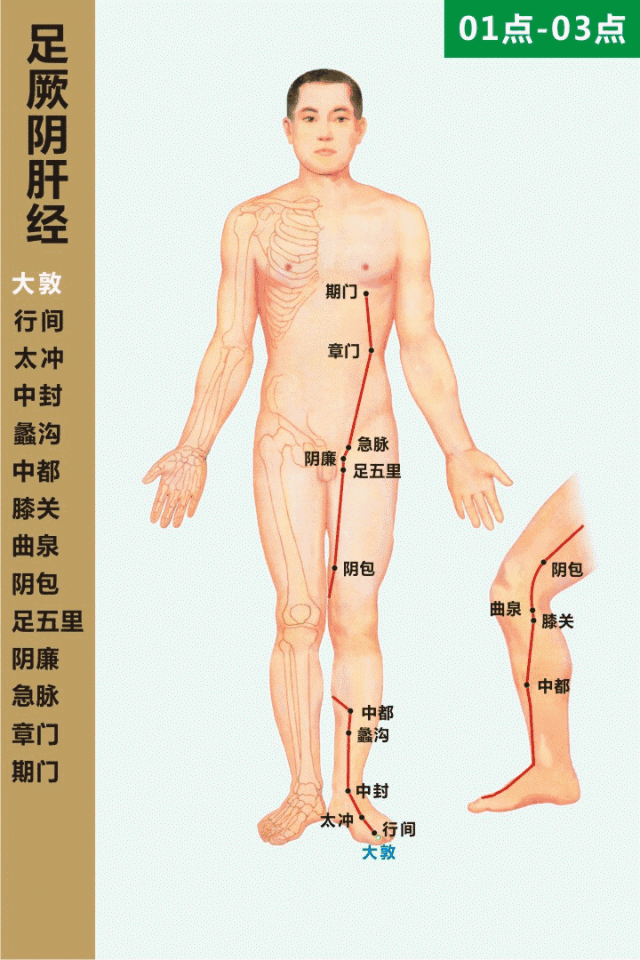
The Liver Meridian corresponds to the Gallbladder Meridian, controlling circulation and secretion; with a greenish complexion, waist pain, dark circles, and dysmenorrhea; dry eyes and excessive eye discharge, excessive liver fire causing issues.
Chou Hour (1 AM to 3 AM) — Liver Meridian is Strong.Not sleeping during the Chou Hour leads to facial blemishes.
Traditional Chinese medicine theory states: “The liver stores blood. When a person sleeps, blood returns to the liver.”
If one cannot sleep during the Chou Hour, the liver continues to expend energy to support thinking and action, failing to complete metabolism.
Thus, those who cannot sleep before the Chou Hour will have a grayish complexion, emotional instability, and are prone to liver diseases, with darkened skin and blemishes.
Deficiency Conditions: Decreased skin immunity, cold hands and feet, numbness, dry throat, cough, etc.
Excess Conditions: Difficulty breathing, throat abnormalities, chest tightness, asthma, tonsillitis, cough, shoulder and back pain, and prone to hemorrhoids.
Health Maintenance: At this time, the body requires a lot of oxygen, necessitating deep breathing, thus requiring deeper sleep.During this time, if you wake up coughing, it is best to drink a cup of warm water to relieve it and also to alleviate lung dryness. It is recommended to choose foods such as cabbage, pears, tofu, soy milk, and milk.
The materials and images in this article are sourced from the internet, compiled by Hongxinglin. Please respect knowledge and labor, and retain copyright statements when reprinting.
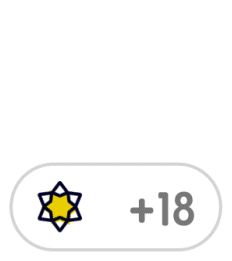
Share to express your appreciationTap to express your agreement

